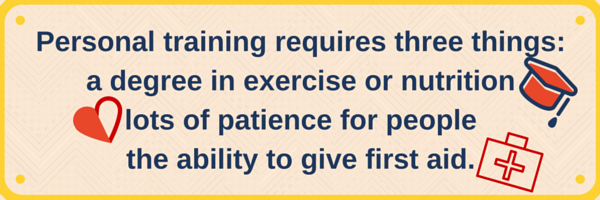Of Fitness and Diets: How to be a Personal Trainer?
November 11, 2017
EasyUni Staff
Things to Know About Becoming a Personal Trainer
A personal trainer is a certified health professional who manages another person's fitness and diet. Personal trainers measure that person's progress by setting goals and giving feedback based on their performance. A trainer may specialise in one of three areas of fitness: Aerobic Exercise, Resistance Training, and Flexibility Performance. Think of a personal trainer as a really muscular teacher who educates their students in areas of health and fitness with someone may not have previously known or understand clearly.

Why should I become a Personal Trainer?
Personal training is a big business. Chances are pretty good that you have already been recommended by friends to come lift weights or stretch on the yoga mats or dance to Beyonce's dance mix in the gym studio. Many personal trainers have become famous on their own as well, dishing out advice for celebrities to be in shape for their latest action blockbuster or music video and selling the next latest exercise fad. With the rise in obesity and other health-related issues in South-East Asia, personal training is fast becoming in demand. Now if you will excuse me, I'm late for my boxercise class.
What should I remember about this career?
You will earn a lot if you know how to make money in the fitness industry. Sports equipment or diet supplement companies will pay for you if you win a lot of fitness competitions or have a large following on social media. If posting yourself flexing on Instagram is not your thing, you can focus on medical science and specialise in a hospital as a professional physiotherapist later in life.
One aspect of personal training is dealing with socially unacceptable behaviour. Trainers often do not have a lot of free time on their hands, and if a person is becoming too friendly with you, it may be a sign of unwanted attention. As a personal trainer, you must use your discretion to tell certain clients that any unwanted behaviour should not be tolerated in a public environment such as the gym or the changing room.
How do I get started?

WHAT TO STUDY?
A degree in sports science, nutrition or exercise science is very helpful. A major survey done by the US-based fitness instructors knowledge assessment (FIKA) in 2002 showed that personal trainers randomly tested on basic medical knowledge of the human body gave more correct answers (up to 31% better) if they had a fitness-related university degree than those who did not have a degree.
HOW DO I DEAL WITH PEOPLE?
You will meet people from all walks of life. Do not assume people to be on time or in the right mood - you may meet the friendliest woman who will always be one hour late for your session, or the grumpiest man who is actually interested more in swimming than doing bench presses. Their emotions will rub off you and affect you for the rest of your day - learn to pick up emotional cues and don't be afraid to ask if anything personal is affecting their fitness goals.
WHY SHOULD I WORRY ABOUT GIVING MEDICAL AID?
Knowledge in first aid assistance is extremely important. It must be stressed that all people are built differently and will respond differently to training. For example, that really pale guy who is breathing funny after running may just be dehydrated from drinking too little water. He might also be having a mild stroke. If you do see emergencies, first aid assistance helps save your clients time for a real doctor to arrive and give a more detailed diagnosis to avoid any major damage.
A very serious issue is the use of illegal steroids and human growth hormone. It is common to hear large and very muscular men (and a few women as well) openly discuss about using it. A few individuals actually suffer from a type of mental disorder called "Bigorexia" that makes them think that they are not large or strong enough, and they must do or use anything possible to make them grow larger. Supplement abuse is very dangerous and can lead to nasty-sounding issues such as hormonal imbalance, organ failure or musculoskeletal degeneration later in life.
You might be interested in...
- Global Learning at the Crossroads: Canada–Malaysia’s Evolving Education Partnership
- How AI is Powering the Next Wave of MSME Growth in Malaysia
- Malaysian Private Universities Making a Mark in Global Rankings
- Benchmarking Malaysian Private Universities Against Their ASEAN Peers
- Step-by-Step Guide to Applying to Malaysian Universities Online in 2025
- Fastest-Rising Malaysian Universities in the QS Rankings (2023‑2025)
- Sunway University Climbs to Global Top 500 in QS Rankings 2026
- Trusted by Top Universities: EasyUni’s Exclusive Visit to Sunway University
- Wawasan Open University and Sophic Automation Partner to Offer Work-Based Learning for Engineering Students
- Sunway University: Malaysia’s Best Cambridge A-Level College with 11 Years of Excellence
 +60173309581
+60173309581






